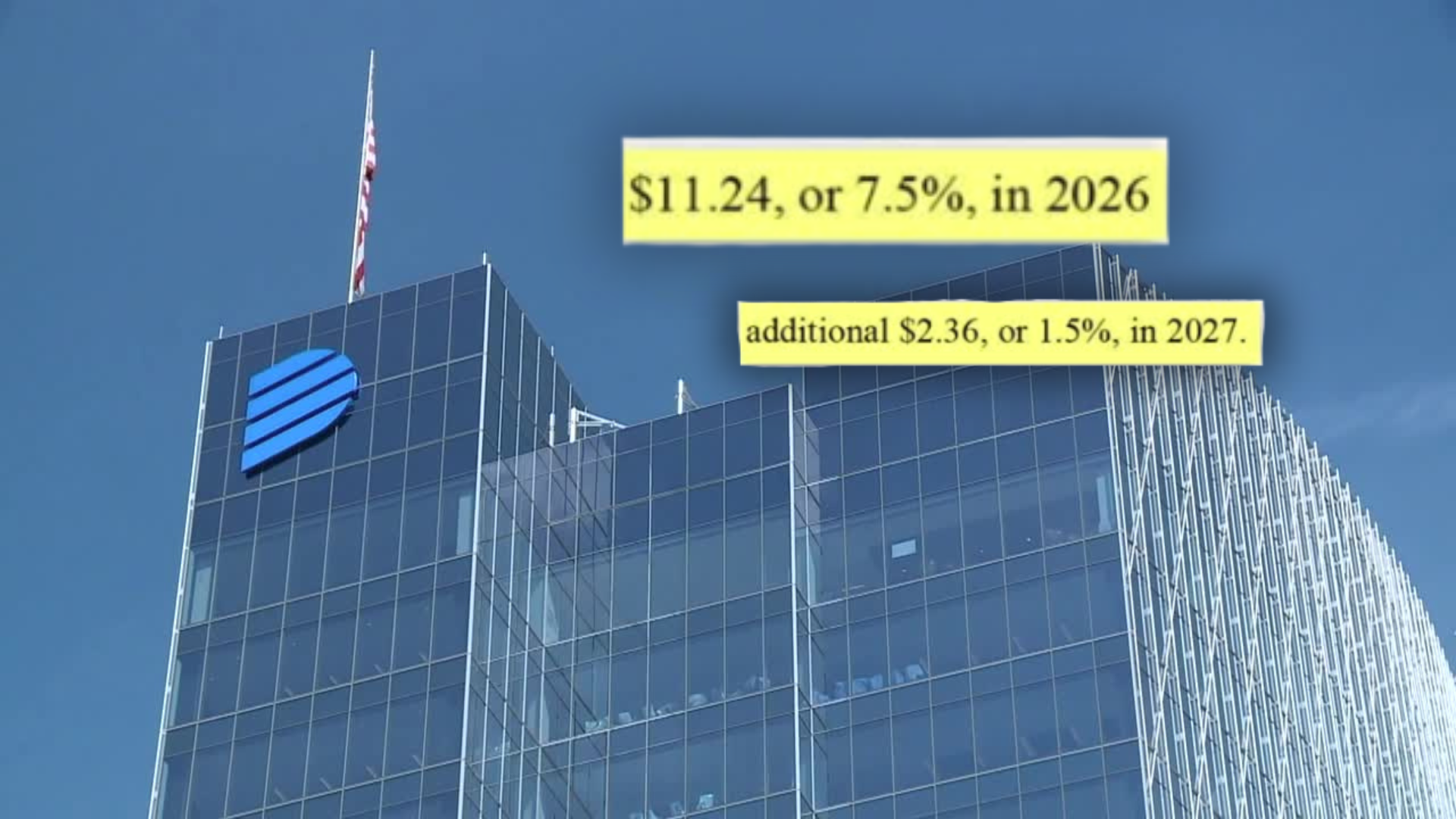RICHMOND, Va. — The average monthly bill for a Dominion Energy residential customer will go up by more than $13 over the next two years, as decided by the State Corporation Commission, which regulates the monopoly utility.
Following months of review, extensive testimony, and input from the public, the commission approved changes to Dominion's base rates that will amount to a monthly increase of $11.24 in 2026 and an additional $2.36 in 2027 for the average household. Overall, the rates approved by SCC were about 30% lower than what the company asked for in its initial proposal to the commission.
The decision was made as part of a regulatory review of the utility's rates, which occurs every two years.
In a final order, the SCC said it was obligated by law to allow Dominion to "recover reasonable and prudent projected costs and earn a reasonable rate of return."
"In this case, that has resulted in an increase in rates, but not to the extent requested by Dominion," the order stated.
Dominion spokesperson Jeremy Slayton said the revenue collected through the rate hikes will help cover costs of grid equipment.
“We're talking about utility poles, wires, transformers. We understand that inflation has hit across everybody's household budget, but those same inflationary pressures are hitting us as well," Slayton said.
'That's going to stink': Virginia react to Dominion Energy rate hike
In its decision, the SCC acknowledged "inflationary, economic, and policy impacts" on the company as well as public concerns that a "rate increase that would impact residential customers was designed primarily to subsidize data centers."
The growth of the data center industry presents "challenges for the Company, existing customers, and the grid at large" that have not been seen in decades or ever, according to the final order.
To that end, the commission also approved the creation of a new customer class specifically for data centers, which will take effect in 2027. Data centers will be required to pay at least 85% of contracted distribution and transmission demand as well as 60% of generation demand in an effort to protect ratepayers from the costs of infrastructure demands.
"These protections are a win for Virginia consumers and will prevent data center costs from being passed on to other customers in the future," Slayton said.
But Brennan Gilmore of Clean Virginia, an advocacy group that promotes clean energy and was involved in the case before the SCC, argues Virginia customers have already been and will continue footing the bill for data centers anyway through the approved rate increases. He called data centers "the driver behind the decisions" in the rate case.
“The demand created by data centers has touched every Virginian who pays an electric bill in one way or another," Gilmore said. "Virginia's electric consumption, if you take away data centers, is largely flat. There has been some minor growth, but not the kind of growth that would trigger a huge infrastructure build out that electric customers will have to pay for.”
CBS 6 reporter Tyler Layne asked Slayton, “How much of the increase that was just approved would you attribute to the expansion of data centers in Virginia?”
“First I wanted to address and I want to point out that there was the recent JLARC study that looked into this issue and determined that data centers were paying their fair share, and one of the recommendations that came out of that study is this separate rate class for these high energy users," Slayton responded.
When asked two more times for a more clear answer regarding how data centers contributed the approved rate increase, Slayton said, “I don’t know how many times I need to say it, that the new base rates are a reflection of the inflationary pressures that we're seeing and the increasing cost of grid equipment that we use.”
The 2024 study by the legislature's research arm that Slayton referenced did say data centers were paying their share of current costs but added their "increased energy demand will likely increase system costs for all customers, including non-data center customers, for several reasons."
One of the recommendations stemming from that report was the creation of a new customer class for data centers, which was accomplished through this biennial review.
Gilmore believes the establishment of the new rate class is a positive step forward but said the SCC didn't go far enough in clarifying who would cover supplemental costs of "what is essentially an AI Gold Rush that's taking place in Virginia."
One of the other changes approved by the SCC is an increase in Dominion's return on equity, the company's allowed profit margin, from 9.7% to 9.8%. The company initially requested a return of 10.4%.
In addition to the base rate increases, another average monthly increase of $8.95 went into effect July 1 on an interim basis. This represents the fuel factor, which covers the cost of generating fuel. An SCC spokesperson said Dominion has requested an additional $2 per month for the fuel factor, but the SCC has not yet ruled on that.
Even with the increases, Slayton said Dominion's rates remain below the national average.
He added Dominion understands the impact that higher bills will have on its customers and is now offering more assistance programs than ever before. Next month, the company will roll out a new webpage to make it easier for customers to learn about the programs and take advantage of them.
CBS 6 is committed to sharing community voices on this important topic. Email your thoughts to the CBS 6 Newsroom.
📲: CONNECT WITH US
Blue Sky | Facebook | Instagram | X | Threads | TikTok | YouTube






